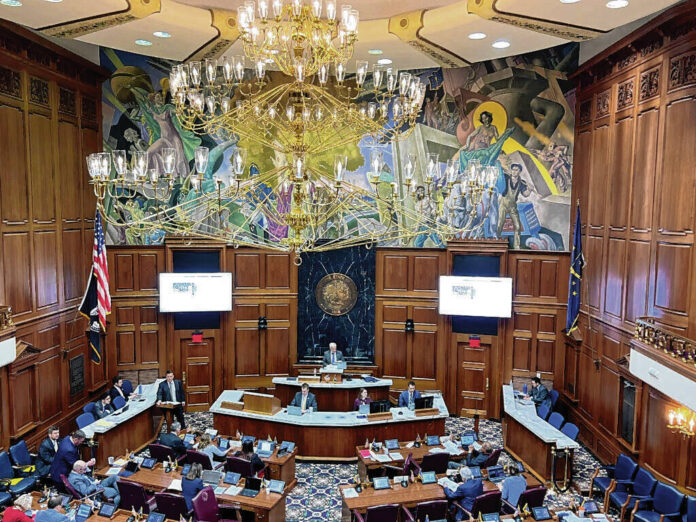
Casey Smith | Indiana Capital Chronicle Indiana’s House Education Committee meets at the Statehouse on Wednesday, Feb. 8, 2023, in Indianapolis.
By Casey Smith | Indiana Capital Chronicle
For The Republic
INDIANAPOLIS — In the final hours of the legislative session, Republican state lawmakers resurrected a much-debated ban on materials deemed “obscene “or “harmful to minors” in school and public libraries.
The House rules committee on Thursday voted 7-3, along party lines, to allow library language to be inserted into House Bill 1447. The underlying bill addresses third-party surveys and evaluations given to K-12 students. The new provision was cobbled together behind closed doors earlier this week in a conference committee.
The bill now requires school libraries to publicly post lists of books in their collection and create a formal grievance process for parents and community members who live in the district to object to certain materials in circulation.

As part of that process, school boards must review those challenges at their next public meeting.
Language in the proposal also seeks to remove “educational purposes” as a reason that schools or school librarians could claim legal protection for sharing “harmful material” with underage students. The charge is a felony.
Public libraries would not be affected, however, despite other proposals debated earlier in the session that would have expanded the language’s reach.
Rep. Ryan Dvorak, D-South Bend, called the last-minute conference committee insert a “sneaky move.”
“What concerns me is that this is just one of those bills that a lot of people have really strong feelings on … and now we’re sort of letting a conference committee that hasn’t been able to take public testimony … I really think this is kind of an example of the wrong way we want to do this policy,” Dvorak said Thursday. “If you want to bring this bill before the House and let us work on it, that’s one thing. But shoving this through the backdoor sends an incredibly bad message to the public that’s really, legitimately concerned about a lot of aspects of this.”
“This is part of what makes the public dissatisfied with the way business is conducted,” he continued. “I don’t think there was a need to do it this way. And that’s why we have the committee process set up. And when you pass bills that make half the state incredibly angry, in a way that doesn’t allow the representatives who represent those people to actually offer amendments on the bill, it does a disservice to the institution.”
But Rep. Martin Carbaugh, R-Fort Wayne, emphasized that different versions of the library language were the subject of more than eight hearings of public testimony and legislative debate earlier in the session.
“I can appreciate the process questions on this … but I take a little exception with the ‘sneak’ comment, because this process is pretty open. This is being streamed live,” Carbaugh said, referring to the rules committee meeting. “We’re going to have an opportunity to debate on the floor if it gets through committee, and we had a lot of public testimony on this already.”
Lawmakers in both the House and Senate must still vote to approve the bill, but no amendments can be made. Rep. Ben Smaltz, R-Auburn, said he expects a “healthy debate” over the language on the chamber floors.
A bill with library language advanced from the Senate but died in the House earlier this session without a hearing. The House Education Committee instead seemed intent on reinserting similar language from that measure — Senate Bill 12 — into another bill.
Although House legislators heard more than four hours of mostly-oppositional testimony on the amendment, a vote was never held. There was no explanation on why not. That previously left the library provision abandoned from any moving legislation.
Many Indiana districts already have processes in place for parents to request review of books and other educational materials.
But some Hoosier parents contend their local school boards have rejected their challenges of certain materials. Republican state lawmakers agreed with those concerns, saying the book current removal process “isn’t working” at the local level and now warrants statewide legislative action to require “transparency between schools, libraries and communities.”
The Indiana Capital Chronicle covers the state legislature and state government. For more, visit indianacapitalchronicle.com.




